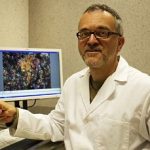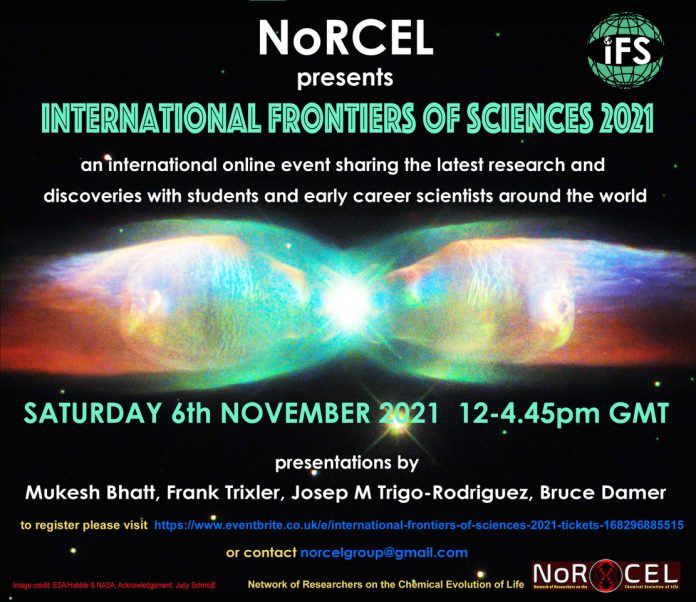The essence of the International Frontiers of Sciences (iFS) is promoting the latest discoveries in the field of the origin of life. In the process we will inspire the next generation of scientists to bring to the fore new thought processes and ideas, as well as develop new technologies to help uncover the routes to the origin of life in the laboratory. This is the best we could hope for, as we will never know with a hundred percent certainty just exactly how life really began on Earth and it may be that making life is a test tube is one of a million ways of synthesising life. Moreover, we just to need to find out the answers in our lifetime…
The iFS is an initiative of the Network of Researchers on the Chemical Evolution of Life (NoRCEL). Other endeavours include the Blue Earth Project (BEP) and the Astroscience Exploration Network (ASEN); promoting science in Sub-Saharan Africa. We are a forward thinking and inclusive network and welcome members from all disciplines and walks of life. For more information, please visit www.nor-cel.net.
Sohan Jheeta, Founder of NoRCEL
====================================================
Abstracts

A future with history: transcultural and interdisciplinary space settlement
Mukesh Chiman Bhatt
School of Law, Birkbeck College, University of London
m.bhatt (AT) physics.org
Abstract: Humanity is likely to settle in space in the near future. This means that it will take its cultural and legal diversity into the settlement established in space. However, this also implies that all the necessary contradictions and conflicts that exist on Earth will also be exported into extra-terrestrial space. This project presumes that such contradictions can be overcome by examining and applying the scientific paradigm to structuring society and the developing economies of settlements in space. It examines the arbitrariness of human law and in particular the law of outer space. Humanity has historically done this by particularising singular aspects (including “universal” science) into a normative ideal. It then considers the possibility using and requiring that the cosmological principle and the unity of science remain inviolate to propose a framework constructed from a multipolar and pluri-central cultural and legal perspective. This may then be applied to the political economy of settlements in outer space. Of importance here is the necessity of retaining and requiring that human law be recognised as arbitrary and separate from the laws of nature within which the Terran biosphere currently exists. The extra-terrestrial ecosystem plus proposed may allow for different perspectives on the future of and the terrestrial biosphere. Whether modern Western science in its current form can be viewed as a meta narrative that is coherent and consistent for all of humanity requires its anthropocentric and anthropogenic activities to be viewed as the agential manifestation of a generalised evolutionary mechanism.
 The origin and nature of nucleic acids: paradoxes, puzzle pieces and the revolution in chemical evolution
The origin and nature of nucleic acids: paradoxes, puzzle pieces and the revolution in chemical evolution
Frank Trixler
Ludwig-Maximilians-Universität München (LMU) Munich, Germany
trixler (AT) lrz.uni-muenchen.de
Abstract: What are nucleic acids? If we change the classical point of view of biochemistry and approach them from the perspective of prebiotic chemical evolution, things become quite weird. Our current understanding of their nature suggests that they are a manifestation of a narrow section between order and chaos where a purpose is possible; that they work with different types of stability at the same time; that they store digital information, encoded in six-bit bytes; and that their origin was a ‘phase transition’ in chemical evolution as they gave birth to replicative chemistry.
We might still be far away from conceiving the big picture of what this all means. Though a closer look at new puzzle pieces we recently got from very different research disciplines shapes the view on nucleic acids, their origin, and the emergence of life fundamentally. In this talk, I will shed light on some of these puzzle elements and their relations. I will give insight into the multifaceted character of nucleic acids’ nature and origin as well as into the fascinating interdisciplinary approach required to find insightful answers and new good questions by those who take the challenge.
 Working on space research: introducing peer-review and manuscript preparation to early career scientists
Working on space research: introducing peer-review and manuscript preparation to early career scientists
Josep M Trigo-Rodriguez
Institute of Space Sciences (CSIC-IEEC), Campus UAB, Barcelona, Catalonia, Spain
trigo (AT) ice.csic.es
Abstract: Early carrier scientists have always doubted when trying to start their scientific carriers. Many young researchers don’t know about the way to produce a scientific paper, neither about the peer-review system, or the way to improve their CV. I’m giving some clues about doing research in the space sector, explaining the way in which a master degree can be transformed in a scientific publication, how scientific editorials work and the needed skills to give visibility to these first papers. Always surround yourself by a collaborative environment to keep learning on these topics from your advisor and colleagues.
 The Hot Spring Hypothesis: New Science of Life’s Origins
The Hot Spring Hypothesis: New Science of Life’s Origins
Bruce Damer
University of California, Santa Cruz, USA
bdamer (AT) ucsc.edu
ABSTRACT: Exciting discoveries in the past decade have built up evidence that life began just as Charles Darwin surmised 150 years ago-in a “warm little pond.” An entire new science is opening with experimenters forming “protocells” on the first possible steps to life in the lab and at actual volcanic hot spring settings. The hot spring hypothesis also carries implications for diverse fields such as artificial intelligence, evolutionary biology, philosophy and even spiritual traditions.



